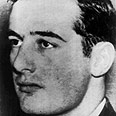
Raoul Wallenberg (Archives)
צילום: AP
New evidence on WWII mystery of Raoul Wallenberg
Archives of Russian Security Services say Swedish diplomat credited with rescuing thousands of Hungarian Jews from Nazis was seen in prison after Soviets claimed he died. 'Everything we believed earlier is turned upside down by this,' researcher says
New evidence from Russian archives suggests Swedish diplomat Raoul Wallenberg, credited with rescuing tens of thousands of Hungarian Jews during the Holocaust, was alive after Soviets reported that he had died in a Moscow prison, a Swedish magazine and US researchers reported Thursday.
The fate of Wallenberg, who was arrested in Budapest in January 1945 by the Soviet army, has remained one of the great mysteries of World War II.
The Soviets claimed he was executed July 17, 1947 but never produced a reliable death certificate or his remains. Witnesses claim he was seen in Soviet prisons or labor camps many years later, although those accounts were never verified.
Now, the archives of the Russian Security Services say a man identified only as Prisoner No. 7, who was interrogated six days after the diplomat's reported death, was "with great likelihood" Wallenberg.
The security services reported the find last November to Susanne Berger and Vadim Birstein, two members of a research team that conducted a 10-year investigation into Wallenberg's disappearance in the 1990s.
The researchers informed Wallenberg's relatives in a letter released for publication Thursday. The findings also were reported in the Swedish magazine Fokus.
'This has to be investigated again'
The information still has to undergo in-depth verification, Berger wrote in the letter, "but if indeed confirmed, the news is the most interesting to come out of Russian archives in over 50 years."
She said strong circumstantial evidence supported the archivists' conclusion of the identity of Prisoner No. 7.
Berger quoted the Swedish ambassador in Moscow, Tomas Bertelman, as saying in a note to the head of the Russian archives last December that if true, the report would be "almost sensational."
As Sweden's envoy in Budapest from July 1944, Wallenberg prevented the deportation of 20,000 Jews destined for Nazi concentration camps or death factories. He also dissuaded German officers occupying the Hungarian capital from a plan to obliterate the city's Jewish ghetto, averting a massacre of its 70,000 residents.
He was arrested the day after the Soviet Red Army seized the city, along with his Hungarian driver Vilmos Langfelder. The Russians never explained why they detained him.
Ove Bring, professor in international law at the National Defense College in Stockholm, said the report by the Russian security services warranted reopening Wallenberg's case.
"Everything we believed earlier (about Wallenberg's death) is turned upside down by this," he told The Associated Press.
"This has to be investigated again. If he was still alive six days later, then maybe he was alive for a longer period of time," Bring said. "Did he live another week, or a year or 10 years? Suddenly that's an open question."
Swedish Foreign Ministry spokesman Teo Zetterman said the ministry has to "look at the information to see what it contains in order to make a decision on what we can do."
Wallenberg's stand against the Nazi occupation forces, his disappearance and the purported "sightings" in the Soviet gulag have made him a folk hero and the subject of dozens of books and documentaries.
The mystery only deepened after the US Central Intelligence Agency acknowledged in the 1990s that he had been recruited for his rescue mission by an agent of the Office of Strategic Services, the OSS, which later became the CIA.
It also has been an on-and-off irritant in relations between Moscow and Stockholm. Russian President Dmitry Medvedev reportedly discussed the case during a visit to the Swedish capital last November.










